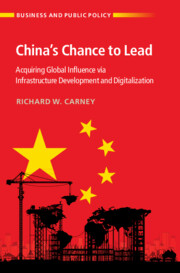Book contents
- China’s Chance to Lead
- Business and Public Policy
- China’s Chance to Lead
- Copyright page
- Dedication
- Contents
- Figures
- Tables
- Preface and Acknowledgements
- Abbreviations
- 1 Introduction
- 2 Market Failures and China’s Chance to Lead
- 3 Measuring Infrastructure Needs and Foreign Infrastructure Investment
- 4 Theory
- 5 Measuring Clientelism and the Corporate Sector across Political Regimes
- 6 Political Regimes and BRI Country-Level Patterns
- 7 Political Regimes and BRI Project Characteristics
- 8 Case Studies of Political Regimes and the BRI
- 9 Chinese Exports of Digital Technologies and Standards
- 10 Conclusions and Implications
- References
- Index
- Business and Public Policy
1 - Introduction
Published online by Cambridge University Press: 02 November 2023
- China’s Chance to Lead
- Business and Public Policy
- China’s Chance to Lead
- Copyright page
- Dedication
- Contents
- Figures
- Tables
- Preface and Acknowledgements
- Abbreviations
- 1 Introduction
- 2 Market Failures and China’s Chance to Lead
- 3 Measuring Infrastructure Needs and Foreign Infrastructure Investment
- 4 Theory
- 5 Measuring Clientelism and the Corporate Sector across Political Regimes
- 6 Political Regimes and BRI Country-Level Patterns
- 7 Political Regimes and BRI Project Characteristics
- 8 Case Studies of Political Regimes and the BRI
- 9 Chinese Exports of Digital Technologies and Standards
- 10 Conclusions and Implications
- References
- Index
- Business and Public Policy
Summary
In 2013, Xi Jinping announced the launch of the Maritime Silk Road Initiative while visiting Indonesia. However, Malaysia became a far more avid recipient of Chinese spending in the years afterward. What can account for this surprising outcome? In this opening chapter, Richard Carney explains that we should care about the answer to this puzzle because it can help us understand how China can acquire global influence by addressing developing countries’ enormous unmet demand for infrastructure and spread the adoption of its digital standards. In contrast to existing explanations that focus on the demand for foreign investment by private firms, Carney proposes a novel explanation for why demand for Chinese SOE-led investment varies across countries. He argues state versus private control over the delivery of clientelist resources varies across political regimes, and this affects the demand for Chinese infrastructure spending that is principally delivered by SOEs. He argues electoral autocracies, which hold semi-competitive elections, possess the highest demand due to their heavy reliance on clientelism coupled with a high level of state control over the corporate sector.
Keywords
- Type
- Chapter
- Information
- China's Chance to LeadAcquiring Global Influence via Infrastructure Development and Digitalization, pp. 1 - 19Publisher: Cambridge University PressPrint publication year: 2023



